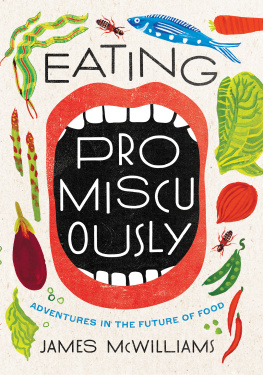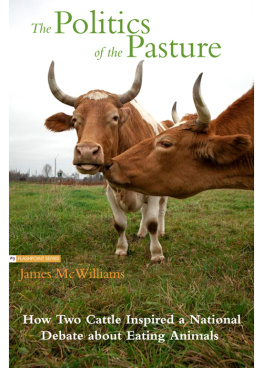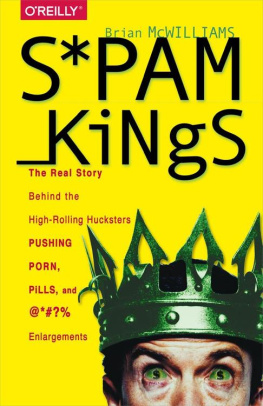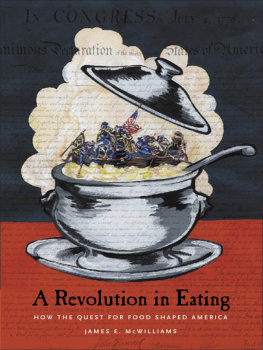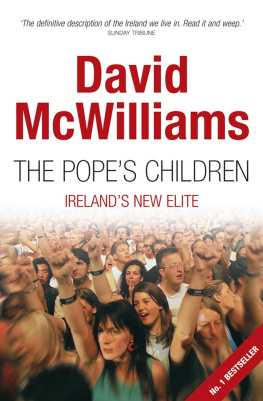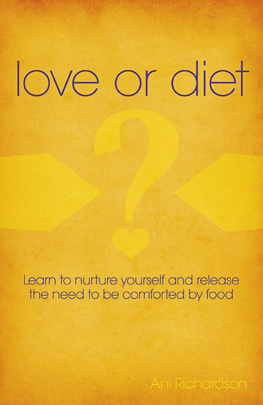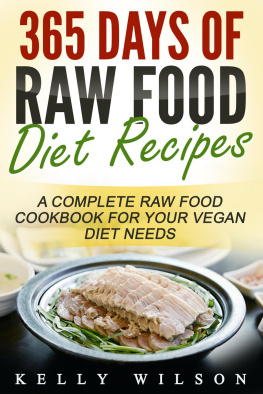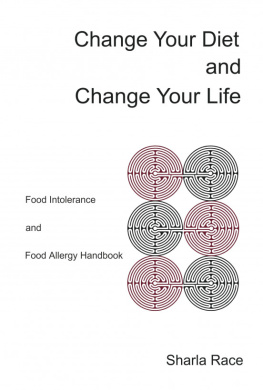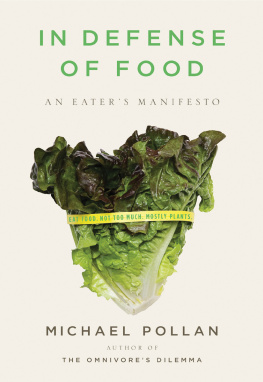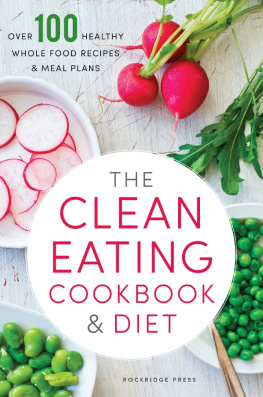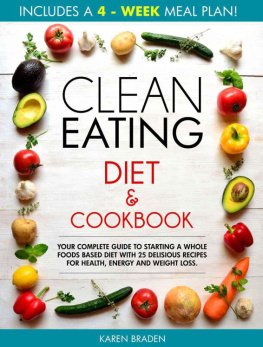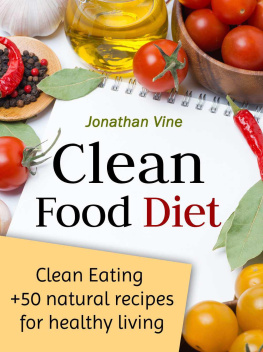McWilliams - Eating Promiscuously: Adventures in the Future of Food
Here you can read online McWilliams - Eating Promiscuously: Adventures in the Future of Food full text of the book (entire story) in english for free. Download pdf and epub, get meaning, cover and reviews about this ebook. City: Washington, year: 2017, publisher: Counterpoint, genre: Romance novel. Description of the work, (preface) as well as reviews are available. Best literature library LitArk.com created for fans of good reading and offers a wide selection of genres:
Romance novel
Science fiction
Adventure
Detective
Science
History
Home and family
Prose
Art
Politics
Computer
Non-fiction
Religion
Business
Children
Humor
Choose a favorite category and find really read worthwhile books. Enjoy immersion in the world of imagination, feel the emotions of the characters or learn something new for yourself, make an fascinating discovery.
- Book:Eating Promiscuously: Adventures in the Future of Food
- Author:
- Publisher:Counterpoint
- Genre:
- Year:2017
- City:Washington
- Rating:4 / 5
- Favourites:Add to favourites
- Your mark:
- 80
- 1
- 2
- 3
- 4
- 5
Eating Promiscuously: Adventures in the Future of Food: summary, description and annotation
We offer to read an annotation, description, summary or preface (depends on what the author of the book "Eating Promiscuously: Adventures in the Future of Food" wrote himself). If you haven't found the necessary information about the book — write in the comments, we will try to find it.
Eating Promiscuously: Adventures in the Future of Food — read online for free the complete book (whole text) full work
Below is the text of the book, divided by pages. System saving the place of the last page read, allows you to conveniently read the book "Eating Promiscuously: Adventures in the Future of Food" online for free, without having to search again every time where you left off. Put a bookmark, and you can go to the page where you finished reading at any time.
Font size:
Interval:
Bookmark:


Copyright 2017 by James McWilliams
All rights reserved under International and Pan-American Copyright Conventions. No part of this book may be used or reproduced in any manner whatsoever without written permission from the publisher, except in the case of brief quotations embodied in critical articles and reviews.
Library of Congress Cataloging-in-Publication Data
Names: McWilliams, James E., author.
Title: Eating promiscuously : adventures in the future of food / James McWilliams.
Description: Berkeley, CA : Counterpoint Press, [2017]
Identifiers: | ISBN 9781619029798
Subjects: LCSH: Food habits. | Diet.
Classification: LCC GT2850 .M37 2017 | DDC 394.1/2dc23
LC record available at https://lccn.loc.gov/2017005010
Jacket design by Faceout Studio
Interior design by Tabitha Lahr
ISBN 9781619029798
COUNTERPOINT
2560 Ninth Street, Suite 318
Berkeley, CA 94710
www.counterpointpress.com
Printed in the United States of America
Distributed by Publishers Group West
10 9 8 7 6 5 4 3 2 1
For Knowles


Introduction
The Bonobo Diet
Your discovery, as best as I can determine, is that there is an alternative which no one has hit upon.
Walker Percy, The Moviegoer
H uman beings have been eating food for almost three million years. But weve been practicing agriculturethe act of forcing plants and animals to stay in one placefor only about the last twelve thousand. Thats only 0.02 percent of our total existence. Industrial agriculture, the kind of farming that feeds the world, has been around for about one hundred years, thus stretching that 0.02 percent to 0.000025 percent. Thats decimal dust.
The way we eat today is brand-newa recent thunderbolt of human experimentation with you and me as the subjects. Not only is it new; its barely a distant echo of anything that came before. Given its late arrival, and given its lack of precedent, agriculture by its nature raises an interesting question: Why should we think we got it right the first time around? Given the process of trial and error behind every other example of human progress, who would ever believe wed succeed on the first shot?
This book opens with the claim that we didnt. In fact, it assumes we thoroughly screwed things up. This assessment holds true not just for the last centurywhen our agricultural sins intensified to the point that we finally took noticebut also for the entire ongoing human effort to domesticate plants and animals for food. The food system isnt brokenit was never fixed.
Locate blame where you see fit, but agricultural development has been a largely unthinking decision made by hundreds of generations through billions of choices about how to secure a consistent supply of food. Theres no single person, corporation, politician, advertising executive, or USDA official to condemn for our culinary condition. Still, its a reality we must live with every time we sit down at the table to eat. The collective decision to practice the sort of agriculture we practiceclear space, plant seeds, tend plants, harvest, feed most of it to animals, repeathas reduced something as necessary to human life as eating to a handful of nutritionally depleted foods. All the while it has asked us to accept the situation as normal.
Im hardly the first person to make this case. When it comes to the task of feeding ourselves, according to Jared Diamond, author of Collapse, we went off the rails about ten thousand years ago. He has called agriculture the worst mistake in the history of the human race, the leading source of malnutrition, starvation, and epidemic diseases, and the underlying reason for such troubles as ecological devastation, deep class divisions, and exploitative power hierarchies. Another critic, Richard Manning, develops a similar argument in Against the Grain: How Agriculture Hijacked Civilization . He contends that from the outset, farmers have proven poorly equipped to deal with the abundance generated by agriculture. As he understands it, agriculture per se leads to a spew of food that increasingly ruins human health (even if we are living longer lives) while destroying the natural environment. Victor Davis Hanson, a former California raisin farmer turned classics professor, furthers the anti-agriculture missive in Fields without Dreams , arguing that farming, when you get down to it, is a foolhardly thing to do.
If prominent thinkers have questioned the nature of agriculture, reformers seeking solutions have yet to heed the message. Instead, theyve worked safely within the confines of the established agricultural regime that Diamond and his fellow critics denounce. The progressive solutions we currently pursueeat local, eat organic, eat from small farms, eat whole foods, eat what grandma ateare, in their small contexts, sensible steps to take. But theyre no more than token solutions. They assume, quite incorrectly, that agriculture is a habit that once was, and once again can be, consistent with the cycles of nature. They look back, in many ways, to an agricultural past that never existed. This vision will never revolutionize how we eat.
The moral weight invested in these popular alternatives makes it seem as if the most important food issue we face today is about making better choices within an existing range of options (or just bringing smaller versions of the old options into existence). Eating food with integrityChipotles clever slogansourced from local farmers who raise their own hogs and make their own cheese has prevented us from fundamentally rethinking the choices themselves. The fact that Chipotlea glorified fast-food hub that has recently suffered from a spate of tainted food productshas come to symbolize reform says a lot about how low the bar has been set.
Then theres the propaganda. A veritable cottage industry of nostalgic agrarian literaturea trend that has nearly turned farming into a kind of poetryhas clogged bookstore shelves with bucolic mythologies centered on the preindustrial farmer. He has become a virtuous yeoman working in tandem with nature to bring us a pesticide-free, family farmstrengthening, value-enhancing cornucopia. This genrewhich sustains the local, organic, and slow alternative to industrial farminghas seduced us through an agrarian fantasy that ultimately glorifies the system that oppresses us.
By assuming, when it comes to agriculture, that we (or at least our ancestors) failed on the first attempt, and by dismissing the present alternatives as inadequate (however romantically the alternatives are presented), this book suggests a different starting point for saving our food system. Admittedly, this starting point is a thought experimentand possibly a fantastic one. But it has the benefit of freeing our imagination to think in more ambitious terms. It asks, what if we could wipe the slate clean and, given what we now know, imagine a radically new way for humans to eat? In other words:
What if we could start over?

Font size:
Interval:
Bookmark:
Similar books «Eating Promiscuously: Adventures in the Future of Food»
Look at similar books to Eating Promiscuously: Adventures in the Future of Food. We have selected literature similar in name and meaning in the hope of providing readers with more options to find new, interesting, not yet read works.
Discussion, reviews of the book Eating Promiscuously: Adventures in the Future of Food and just readers' own opinions. Leave your comments, write what you think about the work, its meaning or the main characters. Specify what exactly you liked and what you didn't like, and why you think so.

